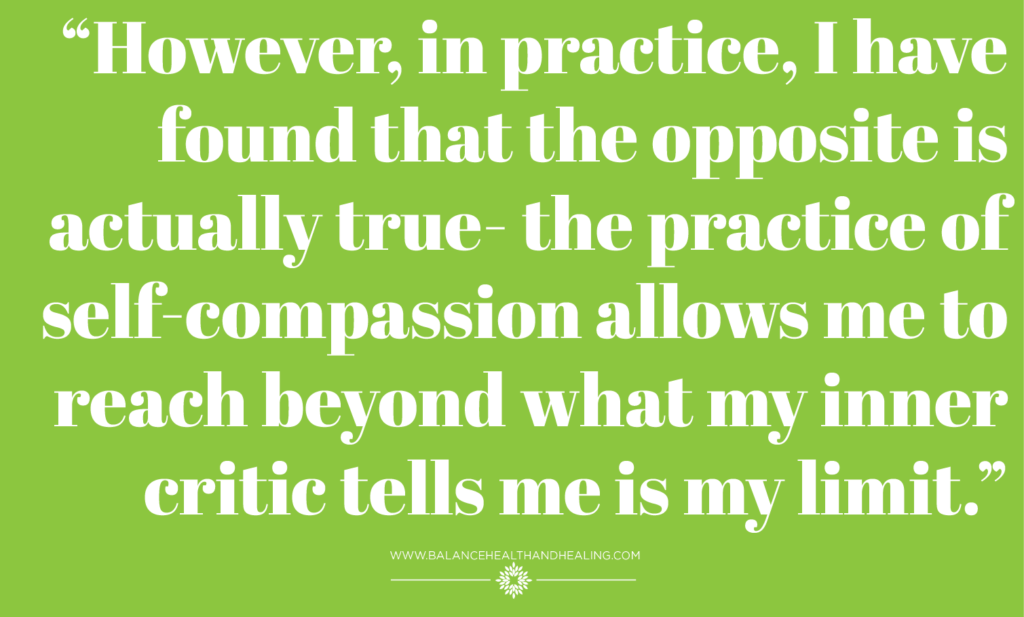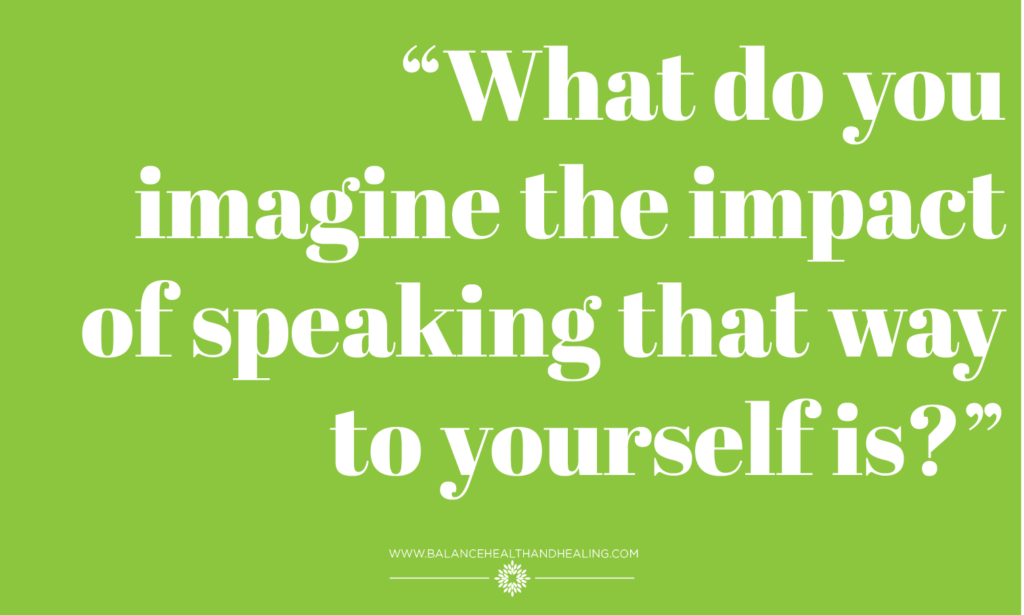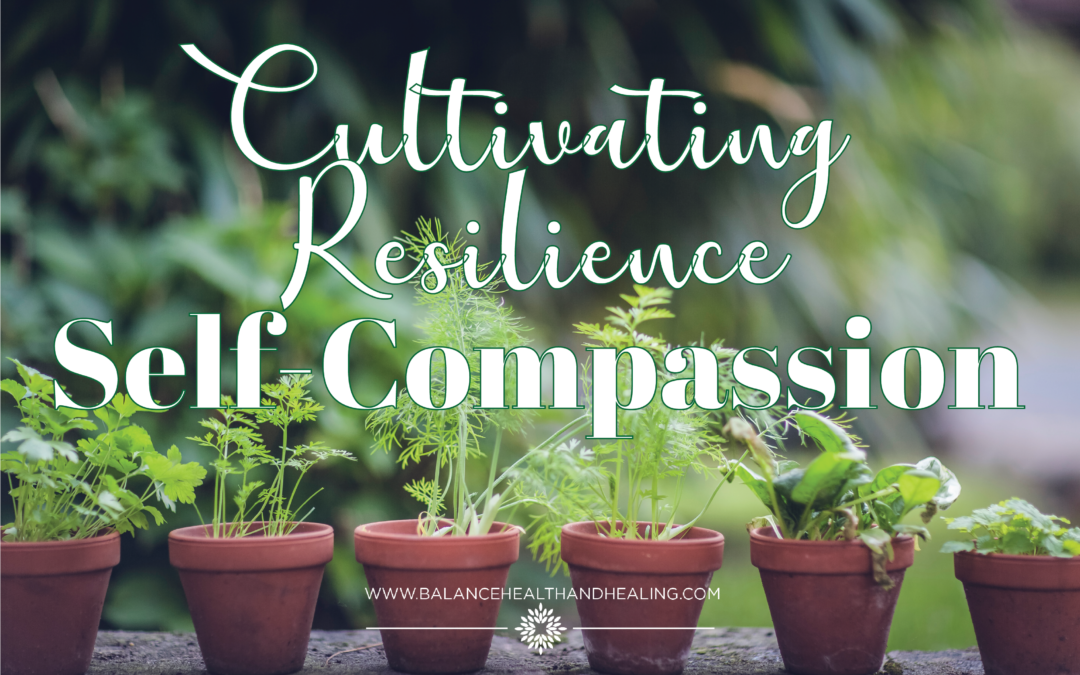I’ve spent a good part of the year blogging about developing resilience, and we have come to the 6th and last specific skill we can cultivate in order to increase our resilience! This month, we will focus on developing the practice of self-compassion.
 In my clinical work, as I bring up the topic of self-compassion, people often balk at the idea at first because they have a sense that exercising self-compassion will result in a lot of lowered standards or letting themselves off the hook for things. However, in practice, I have found that the opposite is actually true- the practice of self-compassion allows me to reach beyond what my inner critic tells me is my limit. It’s allowed me to accept failures with some humor and bounce, instead of progress being halted by a lack of success. It works out this way because once we learn to identify and hush our self-destruction, we free ourselves to explore life to its fullest!
In my clinical work, as I bring up the topic of self-compassion, people often balk at the idea at first because they have a sense that exercising self-compassion will result in a lot of lowered standards or letting themselves off the hook for things. However, in practice, I have found that the opposite is actually true- the practice of self-compassion allows me to reach beyond what my inner critic tells me is my limit. It’s allowed me to accept failures with some humor and bounce, instead of progress being halted by a lack of success. It works out this way because once we learn to identify and hush our self-destruction, we free ourselves to explore life to its fullest!
So, what is self-compassion?
It involves giving compassion to the person we are the least likely to extend it towards- ourselves! It is being aware of when we are struggling or suffering, and addressing those inner needs with warmth and kindness and an attitude of non-judgement. This concept is often illustrated by imagining how you would address a small child or a best friend. When a small child is learning a new skill, how often do you find yourself saying things along the lines of, “Wow, you are really awful at that. Look at how quickly everyone else picked that skill up and look at how much you are struggling! Your sister would never do it that way. She always does everything better than you. You are such a loser.” Most people would never think of speaking that way to a child! However, people often don’t give a second thought when our inner voice is saying critical, judgmental things like that. Stop and listen to what your inner critic sounds like. Ask yourself- would I say those things to my best friend or a child? Would I speak that way to someone I love?
It’s also easy to imagine that speaking that way to a small child could have lasting negative impacts. Speaking that way to a friend could endanger the longevity of the friendship! What do you imagine the impact of speaking that way to yourself is?
the friendship! What do you imagine the impact of speaking that way to yourself is?
The research on self-compassion is fascinating. In one study, participants in an eight-week self-compassion workshop reported more life satisfaction and lower depression, anxiety and stress than the control group- and those benefits lasted a year beyond the 8-week workshop!
Self-compassion work, as described by Dr. Kristin Neff, has three components. It’s about approaching yourself with self-kindness instead of self-judgement, recognizing common humanity (suffering is part of the human condition, we are not alone or unique in our struggles), and exercising mindfulness instead of over identification (not being caught up in our negative thoughts or feelings, instead, being mindfully aware of them; i.e. “I’m feeling a feeling of disappointment in my results” vs “I am a failure”).
When we start to feel distressed, practicing self-compassion can help us approach our difficult feelings with more flexibility, greater insight, and new perspectives. In practice, it can look a little something like this:
{Distressful thoughts/emotions present}
- Self-kindness vs self-judgement: without judgement, recognize the experience: “This is a moment of sadness.” “This is stress.” “I’m learning, it’s ok that I’m not proficient at this yet. I’m getting there.”
- Recognizing common humanity: “We all feel this way at times.” “No one is immune from human frailties; this is a part of life.”
- Exercising mindfulness instead of over identification: “This current feeling will not last forever. Feelings are temporary.” “I can extend myself grace while this feeling of distress is present.”
As we wrap up our discussion of developing resilience skills, I hope you are empowered to take a look at your own emotional toolbox and see what needs to be added! Through examining our connection to others, increasing distress tolerance, practicing self-care, developing our sense of purpose, increasing mental flexibility and practicing self-compassion, we can develop personal skills to approach life with more resilience than ever before, giving us the ability to navigate the difficulty in our lives with purpose and direction.
References:
https://self-compassion.org/wp-content/uploads/publications/germer.neff.pdf

